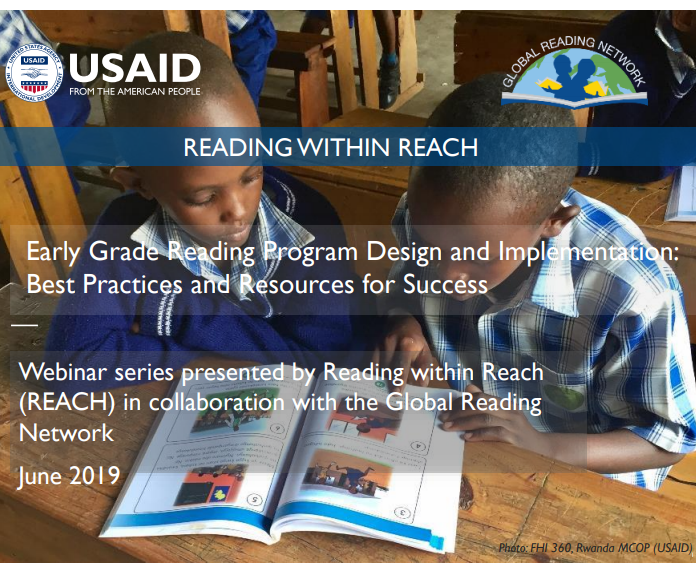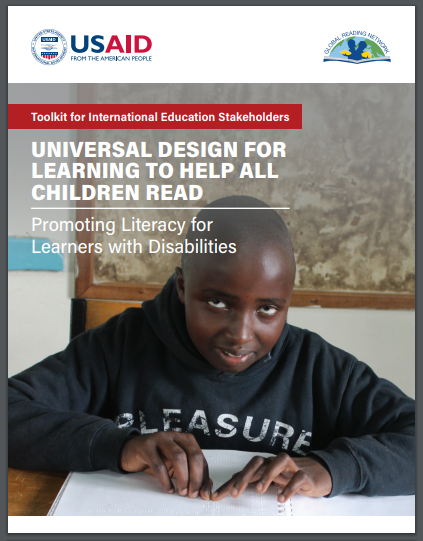Global Reading Network
The Global Reading Network seeks to improve the impact, scale, and sustainability of primary grade reading programs.
The Basic Education Coalition hosted the Global Reading Network in 2020
News
The new GRN website has launched! You can find it here.
Past Events
Thank you to our wonderful panelists and participants on the Evaluating/Assessing Reading Programs during COVID-19 webinar! The recording and notes can be found here.
Thanks to those that participated in the BEC-GRN webinar on Monitoring Reading Programs during COVID-19! The recording and notes can be found here.
For those of you interested in the BEC-GRN webinar on Reading Instruction in the Age of COVID-19 — Planning for the Present and the Future, the recording and notes can be found here.
For more on GRN’s Final Evaluation, click here.
Global Reading Network Resources
Click on the images below to access each resource.
Using Information Communications Technologies to Implement Universal Design for Learning
The paper focuses primarily on how technology can support foundational skills acquisition for students with disabilities, while also explaining when, why, and how technologies that assist students with disabilities can, in some applications, have positive impacts on all students’ basic skills development.
Early Grade Reading Programming Webinar Series
This series provides evidence-based guidance and resources to support the design and implementation of effective EGR initiatives. The five sessions in the series: 1. EGR Programming: From Conception to Scale; 2. Resources for Teaching and Learning EGR; 3. Key EGR Skills and Strategies for Effective Instruction and Assessment; 4. Language Considerations in EGR Programs; 5. Continuous Professional Development in EGR Programs.
Classroom Observation Toolkit for Early Grade Reading Improvement
The purpose of this Classroom Observation Toolkit for Early Grade Reading Improvement is to provide guidance on how to improve the design, implementation and use of classroom observation instruments. The Toolkit summarizes key principles related to classroom observation and provides guidance for developing high-quality observation instruments for use in primary grade reading interventions.
Universal Design for Learning to Help All Children Read: Promoting Literacy for Learners with Disabilities
The toolkit supports the Universal Design for Learning (UDL) educational framework, which guides the development of flexible learning environments that accommodate individuals with learning differences. Providing evidence-based research and information on effective teaching techniques, the toolkit offers information on how to teach early literacy skills to students with different categories of disabilities, including how to best apply these theoretical approaches in practice in low- and middle- income country (LMIC) settings.
Open Licensing of Primary Grade Reading Materials
This resource provides an overview of copyright and licensing, the benefits of open licenses, guidance on choosing and marking work with open licenses, advice on how to engage stakeholders in selecting an open license, and a review of open license business models and ways to leverage open licenses.
Towards the Design and Implementation of Comprehensive Primary Grade Literacy and Numeracy Programs
This resource is intended to support all stakeholders involved in designing, implementing or overseeing early grades literacy and numeracy program development and implementation. It provides a wealth of information about the synergies and unique characteristics of early grades literacy and early grades numeracy programs.
Coaching in Early Grade Reading Programs: Evidence, Experiences, and Recommendations
The purpose of this resource is to summarize research on coaching and EGR program experiences so that the diverse stakeholders involved in designing and implementing coaching programs are better informed and provide guidance on key aspects of coaching, from coach support and training to monitoring and evaluation. It is designed to be informative and accessible to the diversity of organizations and individuals involved in the design, implementation, evaluation and scale up of EGR programs, as well as other efforts to improve teacher professional development.
Assessment to Inform Instruction: Formative Assessment
The goal in this paper is to provide an overview of assessment for learning, commonly called formative assessment. Among several different types of assessment, formative assessment most directly informs instructional practice. Conducted correctly, formative assessment is an essential element in effective primary grade reading instruction.
Promoting Successful Literacy Acquisition through Structured Pedagogy
Research shows that structured pedagogy -- an instructional framework that integrates multiple principles to promote successful learning -- has a significant, measurable effect on students' learning outcomes. This resource defines structured pedagogy, discusses implementation challenges, and offers a case study of a classroom employing structured pedagogy.
Landscape Report on Early Grade Literacy
The Landscape Report reviews and summarizes available empirical evidence on early grade literacy acquisition and instruction in developing countries. Overall, this review substantiates the systematic and systemic nature of literacy education. Promoting successful early grade literacy instruction and acquisition requires evidence-based, empirically tested, and scientific approaches as well as efforts of stake holders at multiple levels, from students, parents, teachers, community members, and leaders in the country.
Sign up for the GRN email list here.
Contact us at GRN@usaid.gov.












